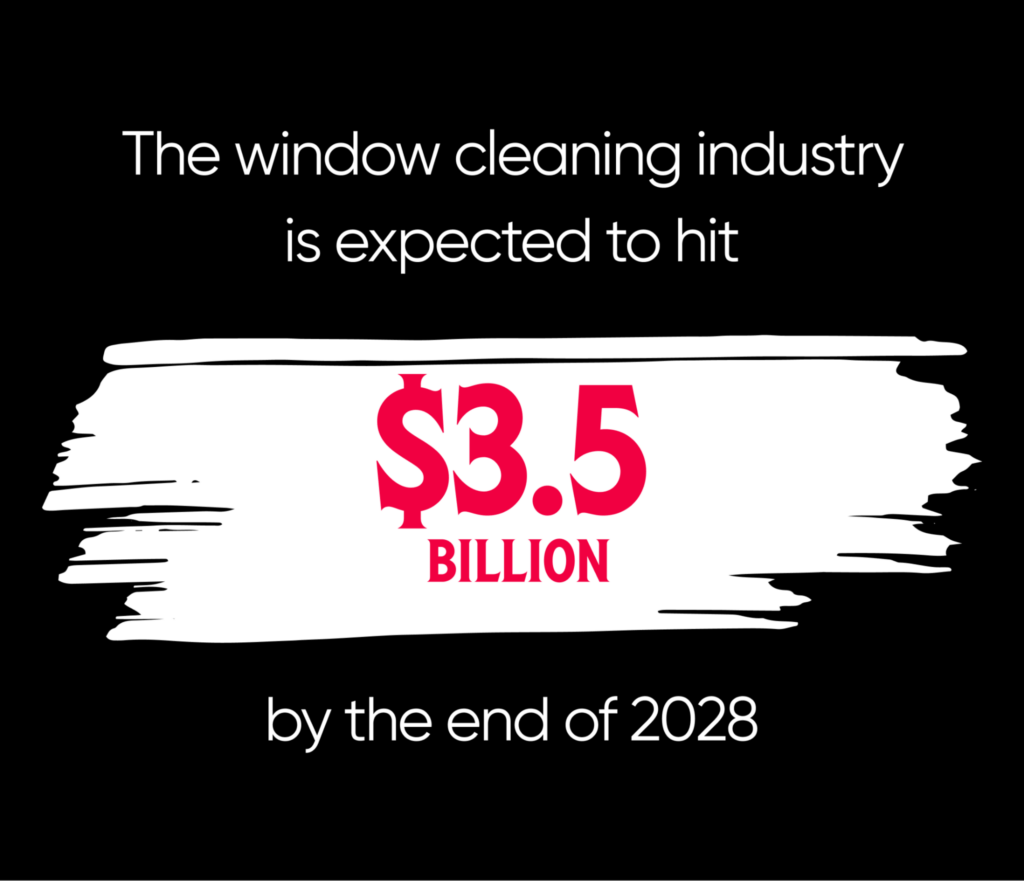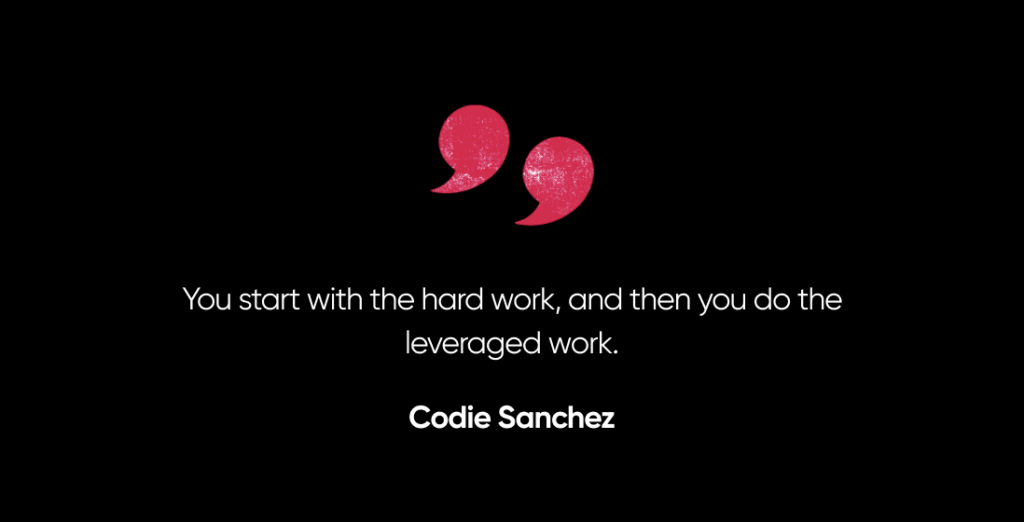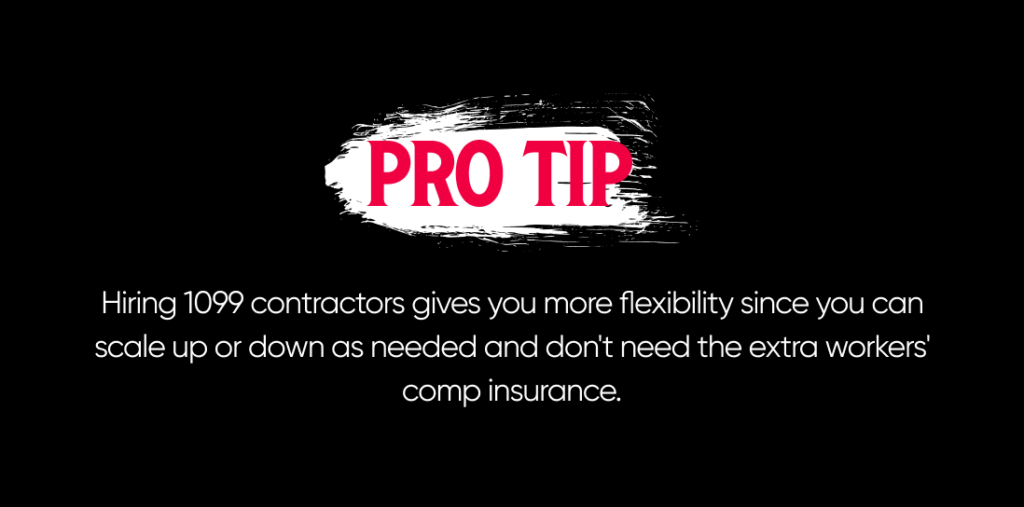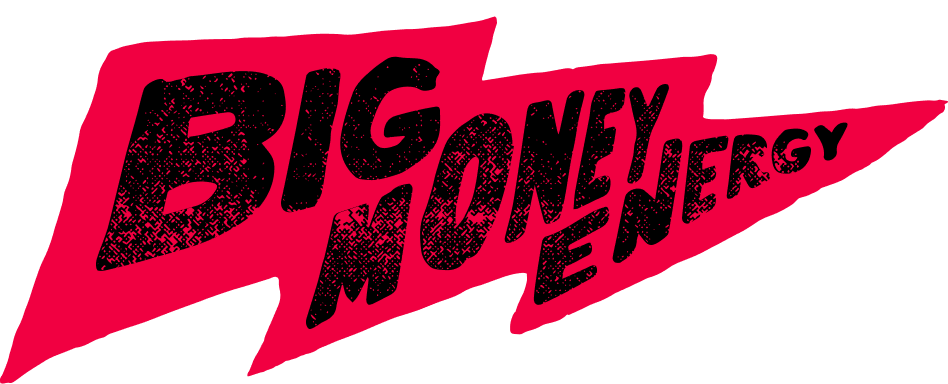
By 2028, the window cleaning industry will grow to a value of $3.5 billion. But there are only 12, 244 window cleaners in the U.S. Together, that spells business opportunity.
Maybe a career built on a squeegee doesn’t sound that sexy.
But you know what is sexy?
Cash money.
Made from an easy-to-break-into business.
One that sells a service people want and need.
#micdrop
Here’s what you need to know if you want to start one of these businesses and why buying an existing window cleaning service is the best option (even if you’re on a budget).
Why Consider Window Cleaning as a Business?
Four reasons window cleaning is a kickass business:
- Recurring revenue (the windows WILL get dirty again)
- No one really enjoys cleaning their home or business windows themselves
- Very little training or supplies involved (= low startup barriers and costs)
- High demand in residential and commercial areas (outside of diehard doomsday preppers who live underground, everyone has windows)
Before you go buy a Costco-size box of rags and Windex, an important note: it’s true that you can make money with just window cleaning.
But the real magic happens with add-on services that allow you to earn more per customer.
Still not believing what’s possible with window washing?
Check out this story of two 19 year olds who invested $150 in cash and turned it into a company worth hundreds of thousands.
You could follow in Sergio and Johnny’s footsteps with a small budget. But most people will end up pounding the pavement for a long time before they hit comfortable profitability.
That’s where the option of buying a window cleaning business comes in.
You can use seller financing to get a great deal on an operational window cleaning business. You’ll start out with a built-in customer base, a team of employees or contractors, and—most importantly—cash flow.
If you’re still sure you want to start a window cleaning company instead of buying one, read on to see what you’ll need.
Steps to Start Your Window Cleaning Business
Any new window cleaning entrepreneur must follow 8 steps:
- Research the market
- Create a business plan
- Check out legal and compliance issues
- Purchase equipment and supplies
- Get your first customers
- Expand your business’ marketing
- Hire and train staff
- Develop a plan to scale
1. Research Your Market

First, you need to know the current window cleaning supply and demand. Call around for quotes in your local area to get a gauge on pricing and availability.
Read through reviews of companies that show up for key search engine terms related to window cleaning in your region, too.
Note what they do well and where they may fall short. Customer complaints make for great ways for you to stand out and earn business as a newbie.
Get an idea of your income goals and how many residential and/or commercial projects that breaks down to per month.
If you’re starting the business in the north, account for a slow season over winter for residential properties. Think of services you could offer during off-seasons that will keep the cash flowing all year round.
Researching your market looks a little different if you’re buying a business.
You can use sites like BizBuySell to find window cleaners across the country who are ready to sell. You can also use BizScout, a site we built to help entrepreneurs buy businesses, to find off-market deals.
An established company has already done the hard work of figuring out what their market wants. And they’ve figured out how to get through off-peak seasons. All you’ll need to do is look at their numbers to tell if their market research paid off.
2. Create a Business Plan
Nail down your target market before you launch. Who will you help? Residential homeowners? Commercial clients? Both?
There’s no wrong answer here, but you might need more equipment and staff for commercial jobs.
You can use a ladder to get to the second story of someone’s home, but you’ll need specialized equipment to hang off a ten-story building cleaning windows. Build those overhead costs into your financial projections.
Your business plan covers:
- Who you’ll serve
- How you’ll reach them
- What makes you different from the competition
- What you expect to make
- Startup costs and ongoing expenses
As you set your prices, protect your time investment.
Quoting a flat fee without a good sense of how long it will take to do the job is a recipe for disaster. You’ll kick yourself after you’ve worked for hours on a big job for pennies in return.
You might start with per-window costs and then move to flat fees in the future.
Most homeowners spend about $10-15 per residential window, with an average cost of $250 for their whole property.
Commercial building owners pay $5-15 per pane, which can add up on bigger properties.
Sergio and Johnny (the 19 year olds who started a $100K+/year window service) started small, quoting per-pane prices going door to door. Over time, they realized they could make more by expanding with more staff and more services.

That’s a gold nugget right there: plan to scale from day one so the entire business doesn’t rely on you scraping gunk off windows.
Getting to the point where you can scale up is easier said than done, though.
You can cut out the growing pains by buying a business that’s already reached the point of scalability. You’ll be able to think of how you can improve the existing plan Instead of crafting a new one.
3. Set Up and Register Your Business
Before you can get out and start washing windows, you need to make sure your business follows all of the appropriate regulations for your area.
Boring, yes. Important, hell yes.
Register your business with the state, and look into any necessary licenses, permits, and insurance.
You’ll need to choose a name for your business when you register.
Pick a name that explains what you do. Names like “Sue’s Services” or “Jake Smith Enterprises” don’t tell your potential customers anything about what you do. But registering as “San Diego Streak-Free Window Cleaning” makes it obvious and could even help you show up for customers searching for local help.
You’ll also need insurance for your new business.
Business insurance needs may vary based on your region. General liability insurance is a must, but if you hire employees to help you, you need workers’ compensation coverage, too.
Pro tip: hiring 1099 contractors gives you more flexibility since you can scale up or down as needed and don’t need the extra workers’ comp insurance.
All you need to do when you buy a window service is make sure the previous owner has all their certs, licensing, and insurance in order. You won’t need to jump through as many hoops as a new business owner would.
4. Purchase Equipment and Supplies
Start small and scale from there. You can always use future revenue to get fancier equipment or to branch into commercial projects.
The must-haves:
- Water-fed poles
- Extension poles with T-bar handles
- Towels
- Ladders
- Cleaning solution
- Buckets
- Squeegees and scrapers
- Water purification system
Buy quality window cleaning equipment that you can get solid use out of since you don’t want junk that breaks mid-job. That makes you look unprofessional and requires you to spend more cash to get the good stuff anyways.
There’s one other category of equipment worth considering, even if you’re starting small: software.
The right software makes estimating jobs and billing for them a breeze. Other software, like a CRM, makes it easy to follow up with customers for repeat business.
Buying a business has an obvious advantage here. You’ll inherit all of the equipment and supplies.
But they may not have software set up for the business—that’s a huge opportunity for you. You can use the cashflow from the business to fund software purchases. This will open the doors to a major upgrade for improving customer relationships and getting more repeat business.
5. Find Your First Customers
It’s hard to get the first few customers on board.
You won’t have an online reputation to trade on and attract new customers when you first start out. You’ll need to rely on different tactics.
Start with people or business owners you know to get the ball rolling. Chances are people who already know you will be willing to give your new business venture a try.
Go door-to-door in neighborhoods with lots of homes. You may get business on the spot or future work when the neighbors envy the sparkling windows of people who do hire you.
You won’t need to do this if you purchase an established window cleaning business. An ideal business is already past the point where they’re struggling to get their first customers. They may still have door-to-door sales as part of their process, but they’ve also built a customer base and have some recurring contracts.
6. Reach More Customers with Marketing
Sergio & Johnny rocked the door-to-door game, but they didn’t stop there.
Build your online presence from the get-go so the pavement pounding doesn’t last forever.
That means:
- Setting up a profile on Google Business with your full business name, hours, and contact details
- A business website that makes it easy for people to see what you do and get in touch
- Social media profiles where you can post before/afters
Deliver an outstanding experience to your first few customers (and honestly, all of them, but really go above and beyond when you’re building your business).
If they seem happy when you finish, prompt them to leave a Google review right then and there through your CRM or with text message software. Those reviews boost your business profile and build trust with new customers.
Thrilled customers can also turn into marketing megaphones if they share your name through word of mouth.
You can also use local advertising like events and promotions, coupons, and physical/digital ads in regional publications.
Get a good logo and use it on things like:
- Business cards
- Flyers
- Company shirts for your workers
- Your branded vehicle
Marketing your business never stops.
Improving the business’s marketing performance is something that you can start doing right away if you purchase an established business. An ideal business purchase will already have some marketing in place. But that doesn’t mean you can’t find new or better ways to reach potential customers.
7. Hire and Train a Team
The real deal: if you don’t hire other staff, you’re looking at long hours in the hot sun cleaning windows.
It’s not a bad way to make some cash, but that might get old after a while.

Hiring additional staff frees you up to serve in an operational or owner role. Take on 1099 contractors you can train for quality, safety, and customer service.
Working with 1099 contractors is a huge benefit for your business for a few reasons:
- You won’t have to pay contractors’ mileage
- You’re not responsible if their vehicle breaks down or has issues (unlike if you gave them a company car)
- If contractors break equipment, they pay for it
If you can, build a training program so you provide consistent quality to all of your clients. Every contractor should walk away clear on your expectations of what a finished job looks like.
With good pay, consistent scheduling, and some level of flexibility, you’ll attract and keep awesome staff you can count on as the business grows.
Continue to listen to employee and contractor feedback. Look for ways to improve efficiency with your staff and services. Who knows, your contractors might even have good ideas about add-on services they keep getting asked about on the job.
Building a hiring process is a challenge for many new business owners. You become so focused on the task at hand that thinking of ways to find, hire, and train people becomes an afterthought.
With an existing business, on the other hand, you’ll start off with a team of window washers. Even better, you’ll get to use the company’s process for hiring and training new employees or contractors.
8. Scaling and Growing Your Business
Doing more per customer maximizes your revenue. The weather in your area might limit your business to a seasonal offering. Customers may not need window washing enough to grow profits the way you’d like.
Once you have a solid team and systems (like scheduling, estimating, and invoicing software), evaluate other services like:
- Gutter cleaning
- Power washing
- Hanging up Christmas lights
- Window tinting
- Mirror cleaning
- Light fixture cleaning
- Window screen cleaning
These other services help round out business in an area with primary demand during spring/summer and make it easier for customers to tackle multiple projects at once.
It’s Crystal Clear: You Should Start a Window Cleaning Business
It’s not really that hard to clean windows. But with a lot of windows or any of them on floors above ground level, it’s a task most people don’t want to take on.
It’s amazing how many aspiring entrepreneurs overlook the basic and boring businesses that stand the test of time because people need them.
NFTs and software companies get all the hype, but they fade out or fail often.
Yet 7 in 10 Americans live in single-family homes with windows that accumulate grime over and over. And that’s to say nothing of the tons of commercial properties that want to present a clean, professional appearance to the world.
You can tap into that market by starting a window cleaning service. But if you want to get more out of it, then buying an established company will let you provide a valuable service while being more profitable quicker than starting from the bottom.




